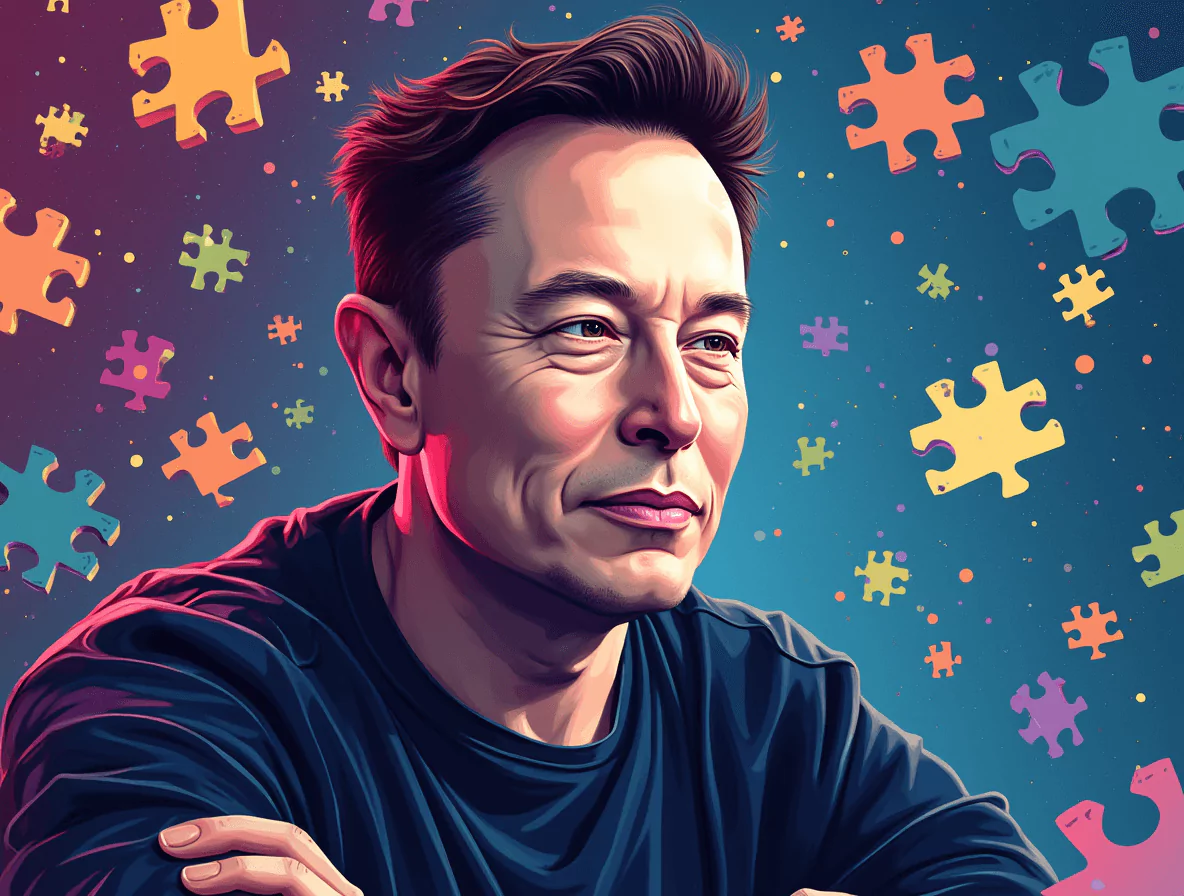With 9 years of experience in the kitchen, I’m passionate about crafting delicious recipes and sharing them with food lovers worldwide. 🍽️✨ Whether it’s a comforting homemade dish or a creative cocktail, my goal is to make cooking fun, easy, and enjoyable for everyone. Join me on this flavorful journey! 🍹🥗

Elon Musk Autism: 2024 Insights on Advocacy, Impact & Neurodiversity
Table of Contents
What to Look for in Understanding Elon Musk’s Autism
When examining Elon Musk’s neurodivergent traits, it’s important to approach the topic with sensitivity and respect. Musk’s public disclosure has sparked conversations about neurodiversity in the workplace, leadership, and innovation. Understanding his experience requires acknowledging that autism is a spectrum, with individuals experiencing it differently. It is important to approach the topic with empathy and awareness of the complexities involved. You can learn more about our approach to inclusive content.
Key Features of a Neurodiversity-Inclusive Approach
A neurodiversity-inclusive approach recognizes and values the diverse range of cognitive abilities and perspectives present in society. This includes:
- Acceptance: Acknowledging autism as a natural variation in the human brain.
- Inclusion: Creating environments where individuals with autism feel welcomed, respected, and supported.
- Accommodation: Providing necessary adjustments and accommodations to ensure equal opportunities.
- Awareness: Promoting understanding and reducing stigma through education and advocacy.
Musk’s journey highlights the importance of fostering environments where neurodivergent individuals can thrive and contribute their unique talents. He openly talks about how his brain works differently and embraces his neurodiversity.
Top 5 Contributions to Neurodiversity Advocacy
While Elon Musk’s autism diagnosis wasn’t widely known for many years, his public discussion of it has had a significant impact on neurodiversity advocacy. Here are five key contributions:
Detailed Reviews of Musk’s Impact on Neurodiversity
- Increased Awareness: Musk’s disclosure has brought autism into mainstream conversations, raising awareness among a broader audience.
- Challenging Stereotypes: His success challenges stereotypes associated with autism, demonstrating the potential for innovation and leadership.
- Promoting Acceptance: By openly discussing his experiences, Musk encourages greater acceptance and understanding of neurodiversity.
- Inspiring Others: His story inspires other individuals with autism to embrace their differences and pursue their goals.
- Advocating for Inclusivity: Musk’s influence can be leveraged to advocate for more inclusive policies and practices in workplaces and educational institutions.
His position as a prominent CEO of multiple successful ventures amplifies his voice and impact on neurodiversity discourse.
How to Understand the Nuances of Autism
Understanding the nuances of autism spectrum disorder, or autism in general, requires moving beyond surface-level knowledge and delving into the complexities of the condition. It’s crucial to avoid generalizations and recognize the individuality of each person on the spectrum. We offer comprehensive services to promote understanding and awareness.
Matching Understanding to Individual Preferences
To gain a deeper understanding:
- Listen to Autistic Voices: Prioritize listening to and learning from autistic individuals about their experiences and perspectives.
- Educate Yourself: Seek out reliable information from reputable sources, such as autism organizations and research institutions.
- Challenge Assumptions: Question your own assumptions and biases about autism, and be open to learning new perspectives.
- Respect Individuality: Recognize that each person with autism is unique, with their own strengths, challenges, and preferences.
- Promote Empathy: Cultivate empathy and understanding by trying to see the world from the perspective of someone with autism.
It is also beneficial to understand the history of autism and how diagnostic criteria have evolved over time. External resource: Autism Speaks offers comprehensive information.
Understanding the Spectrum and Individual Experiences
Autism is a spectrum condition, meaning that its symptoms and characteristics can vary widely from person to person. Understanding the spectrum is essential for avoiding generalizations and appreciating the diversity of experiences within the autistic community. When considering Elon Musk’s neurodivergent traits, it is crucial to remember his experience is unique and not representative of all individuals with autism.
Cleaning and Descaling Best Practices for Understanding Neurodiversity
- Varied Presentations: Autism can manifest in different ways, with some individuals exhibiting exceptional talents and abilities, while others may face significant challenges in daily living.
- Individual Strengths: Each person with autism has their own unique strengths and interests, which should be recognized and supported.
- Communication Styles: Communication styles can vary, with some individuals using verbal language fluently, while others may rely on alternative forms of communication.
- Sensory Sensitivities: Sensory sensitivities are common, with some individuals being highly sensitive to certain stimuli, such as sounds, lights, or textures.
- Support Needs: Support needs can vary depending on the individual’s strengths, challenges, and goals.
Understanding the spectrum requires ongoing learning and a commitment to respecting the individuality of each person with autism.
2024 Trends and Innovations in Neurodiversity Support
The field of neurodiversity support is constantly evolving, with new trends and innovations emerging to improve the lives of individuals with autism and other neurodevelopmental conditions. In 2024, several key trends are shaping the landscape of neurodiversity support. While specifically analyzing Elon Musk’s contributions, it’s important to see the broad trends that affect the entire community.
Smart Technology in Modern Neurodiversity Support
- Assistive Technology: Assistive technology plays a crucial role in supporting individuals with autism, with tools and devices designed to enhance communication, learning, and daily living skills.
- Early Intervention: Early intervention programs are increasingly focused on identifying and addressing developmental delays in young children, with the goal of maximizing their potential.
- Employment Opportunities: There is a growing emphasis on creating inclusive employment opportunities for individuals with autism, with companies recognizing the value of neurodiversity in the workplace.
- Mental Health Support: Mental health support is becoming more accessible and tailored to the specific needs of individuals with autism, addressing issues such as anxiety, depression, and social isolation.
- Community Building: Community-based programs and initiatives are fostering social connections and creating supportive networks for individuals with autism and their families.
These trends reflect a growing understanding of neurodiversity and a commitment to creating a more inclusive and supportive society. Please contact us for more details.
Frequently Asked Questions
Here are some frequently asked questions about autism and neurodiversity:
What are the key characteristics of autism?
Autism is characterized by a range of social, communication, and behavioral differences. These can include difficulties with social interaction, repetitive behaviors, sensory sensitivities, and communication challenges. However, the presentation of autism varies widely from person to person.
How is autism diagnosed?
Autism is typically diagnosed through a comprehensive evaluation by a team of professionals, including psychologists, psychiatrists, and developmental pediatricians. The evaluation may involve observations, interviews, and standardized assessments to assess social, communication, and behavioral characteristics.
What type of support is available for individuals with autism?
A wide range of support services is available for individuals with autism, including early intervention programs, educational accommodations, therapy services, vocational training, and community-based support groups. The specific type of support needed will vary depending on the individual’s strengths, challenges, and goals.
What is the importance of neurodiversity in the workplace?
Neurodiversity in the workplace refers to the inclusion of individuals with diverse neurological conditions, such as autism, ADHD, and dyslexia. Embracing neurodiversity can lead to increased innovation, creativity, and problem-solving abilities, as well as a more inclusive and equitable work environment. Companies are increasingly recognizing the value of neurodiversity and implementing programs to recruit and support neurodivergent employees. A great article on this can be found on Forbes.
How often should I clean my coffee maker for optimal performance?
The question of coffee maker maintenance seems out of place in this FAQ on neurodiversity and Elon Musk’s autism. If you’re looking for coffee maker cleaning tips, please search for relevant articles.




